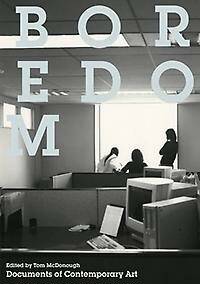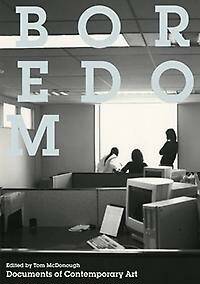
Bedankt voor het vertrouwen het afgelopen jaar! Om jou te bedanken bieden we GRATIS verzending (in België) aan op alles gedurende de hele maand januari.
- Afhalen na 1 uur in een winkel met voorraad
- In januari gratis thuislevering in België
- Ruim aanbod met 7 miljoen producten
Bedankt voor het vertrouwen het afgelopen jaar! Om jou te bedanken bieden we GRATIS verzending (in België) aan op alles gedurende de hele maand januari.
- Afhalen na 1 uur in een winkel met voorraad
- In januari gratis thuislevering in België
- Ruim aanbod met 7 miljoen producten
Zoeken
Omschrijving
Without boredom, arguably there is no modernity: the current sense of the word emerged simultaneously with industrialisation, mass politics and consumerism. From Manet onwards, when art represents the everyday within modern life, encounters with tedium are inevitable. And from modernism's retreat into abstraction to subsequent demands placed on audiences, from the late 1960s to the present, the viewer's endurance of repetition, slowness or other forms of monotony has become an anticipated feature of gallery-going. In contemporary art, boredom is no longer viewed as a singular experience; rather, it is contingent on diverse social identifications and cultural positions, and extends from a malign condition to be struggled against, to an experience to be embraced, or explored as a site of resistance.In this anthology, the range of boredoms associated with our neoliberal moment is contextualized in a long view which encompasses the political critique of boredom in 1960s France; the simultaneous aesthetic embrace in the USA of silence, repetition or indifference in Fluxus, Pop, Minimalism and conceptual art; the development of feminist diagnoses of malaise in art, performance and film; Punk's social critique and its influence on theories of the postmodern; and the recognition from the end of the 1980s of a specific form of ennui experienced in former communist states. Today, with the emergence of new forms of labour alienation and personal intrusion, deadening forces extend even further into subjective experience, making the divide between a critical and an aesthetic use of boredom ever more tenuous.Artists surveyed include Chantal Akerman, Francis Alys, John Baldessari, Vanessa Beecroft, Bernadette Corporation, John Cage, Critical Art Ensemble, Merce Cunningham, Marcel Duchamp, Fischli & Weiss, Claire Fontaine, Dick Higgins, Jasper Johns, Donald Judd, Ilya Kabakov, Boris Mikhailov, Robert Morris, John Pilson, Sigmar Polke, Yvonne Rainer, Robert Rauschenberg, Ad Reinhardt, Gerhard Richter, Situationist International, Mierle Laderman Ukeles, Andy Warhol, Faith Wilding, Janet Zweig.Writers include Ina Blom, Nicolas Bourriaud, Jennifer Doyle, Alla Efimova, Jonathan Flatley, Julian Jason Haladyn, The Invisible Committee, Jonathan D. Katz, Chris Kraus, Tan Lin, Sven Lutticken, John Miller, Agne Narusyte, Sianne Ngai, Peter Osborne, Patrice Petro, Christine Ross, Moira Roth, David Foster Wallace, Aleksandr Zinovyev.
Specificaties
Betrokkenen
- Auteur(s):
- Uitgeverij:
Inhoud
- Aantal bladzijden:
- 240
- Taal:
- Engels
- Reeks:
Eigenschappen
- Productcode (EAN):
- 9780854882526
- Verschijningsdatum:
- 1/09/2017
- Uitvoering:
- Paperback
- Afmetingen:
- 148 mm x 210 mm
- Gewicht:
- 558 g

Alleen bij Standaard Boekhandel
+ 47 punten op je klantenkaart van Standaard Boekhandel
Beoordelingen
We publiceren alleen reviews die voldoen aan de voorwaarden voor reviews. Bekijk onze voorwaarden voor reviews.









